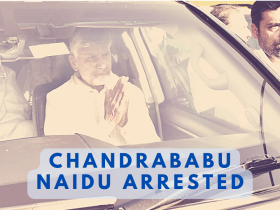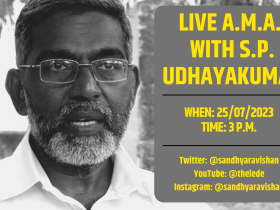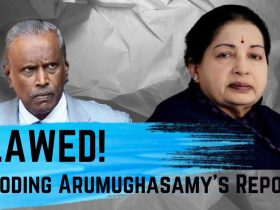Under the hot sun of mid-March in 2011, hundreds of fishermen, activists and villagers along the coasts of Tirunelveli assembled at the tiny fishing hamlet of Idinthakarai.
They were protesting against the Kudankulam nuclear power plant situated barely six kilometres away.
The state government with J Jayalalithaa at the helm, initially went soft on the protesters, almost encouraging them. She had a political point to score against the UPA 2 government at the Centre, led by Prime Minister Manmohan Singh.
The protests against a much-delayed nuclear power project signed between Russia and India during Deve Gowda’s stint as Prime Minister, had been going on in coastal Tirunelveli since the 1980s.
It turned into a huge protest, that made the world take note, only in 2011.
By March 2012 though, with the state wracked by incessant power cuts, Jayalalithaa changed her stance. She needed the power that Kudankulam could generate. A police crackdown began.
21 cases of sedition were filed against 8956 people, 21 cases against 11,000 people for waging war against the state. 12,000 protesters from three villages were named as accused in a variety of cases. Over 1800 protesters were arrested and later released.
The protests were dismantled by the Jayalalithaa government in 2012.
In 2013, the power plant reached criticality and began to generate power.
But there was something quite interesting taking place behind the scenes of the Tamil Nadu Geology and Mining Department as well as the Central Ministries of Mines and the Ministry of Environment and Forests during this time.
Allowing A Miner To Mine A Nuke Power Plant
Construction of the Kudankulam nuclear power plant began in 2002. The construction itself was delayed for several reasons and protests too were taking place sporadically by locals, largely fisherfolk.
The land on which the plant is built officially belongs to the Department of Atomic Energy, a portfolio held by the Prime Minister of India. It is a high security zone.
On 12 August 2011, then Industries Secretary Sundaradevan signed an application giving permission to VV Mineral to mine beach sand minerals over a total area of a whopping 300 acres across six villages of Tamil Nadu.
The villages covered are Thiruvambalapuram, Chettikulam, Vijayapathi, Koodankulam, Irukkandurai and Levinjipuram in Tirunelveli district. This application had been pending clearance since 1994.
The mining leases were given for a 20-year period. Strangely, the Ministry of Environment and Forests had given the mining firm environmental clearances even before the state government granted the mining lease.
But the devil is always in the detail.
Many of the survey numbers mentioned in the mining lease given to VV Mineral for mining in Koodankulam village, are those of the nuclear power plant itself.
Meaning that the state Industries Department, without bothering to check the survey numbers or do a field inspection, simply signed away approvals to a miner to mine the high security Kudankulam nuclear power plant.
In fact, the survey numbers approved by the state government show a stretch of 30 kilometres of the coast of Tirunelveli which have been given through one single permission by the state government of Tamil Nadu.
“The issuance of 300 acres of mining leases in one go is in itself is a violation of the MMDR Act (Mines and Minerals Development & Regulation),” said a top source in government who did not wish to be named as he feared persecution.
“Environmental clearances cannot be given without the state giving mining leases. In this case, it has been done in reverse. All of these are illegal,” he added.
Sundaradevan, the bureaucrat who issued the leases, is now retired but is an Independent Director with Tidel Park, Coimbatore and Manali Petrochemicals amongst a whole host of other state government and private firms. Attempts to reach him for a response went in vain.
“It is widely known that valuable minerals are often indiscriminately extracted in India at great environmental cost and exported to other countries through under-invoiced deals,” said EAS Sarma, former bureaucrat who was with the Union government.
“Such mining activity not only deprives India of what is due from the full value of the mineral but also leaves an ugly trail of environmental degradation that is difficult to repair.
This has become possible through a close nexus between the miners and the corrupt politicians and officials.
No wonder that mining leases in such cases are granted irregularly and the other statutory clearances rushed through on the basis of falsified information.
The fact that a mining lease had been granted within the premises of a nuclear power project, if proved correct, corroborates the extent of corruption that seems to prevail,” he said.
Police officers who were monitoring the Kudankulam protests at the time told The Lede that some of the villagers associated with VV Mineral were “actively working for the protests.” Another officer claimed that he had funded the protests initially but was later “warned off from the top.”
But when asked whether the owner of VV Mineral, S Vaikundarajan, had offered any support monetarily or otherwise, the leaders of the protests denied the same.
“No, he never offered any help whatsoever to the anti-KKNPP struggle,” said SP Udayakumar, who was the convenor of PMANE, the forum which led the protests. “In the initial stages, some people suggested meeting him but I refused to do so as I had participated in anti-VV protests with Medha Patkar etc. We also chose not to tease him in any way as we couldn’t fight too many enemies at the same time. More importantly, there were some people in several coastal villages on VV’s payroll and we didn’t want to create internal troubles for ourselves. After a Koothenkuzhi boy was killed by the company, we started talking against the company openly. I have never had any kind of direct or indirect contact with the VV people and It will never change in future also,” he told The Lede.
Exports Continued Despite Ban
As The Lede had detailed earlier in the series, beach sand mining was banned in 2013 by the Jayalalithaa-led state government.
Mining The Coasts Of Tamil Nadu
Subsequently, the miners have been dragged to the Madras High Court and documents available with the court now reveal that the miners had been mining even during the ban period between 2013 and 2017.
The Green Blood Project collaboration has gained access to export data of the beach sand miners from January 2013 to November 2016. The data is from the Tuticorin Port and this data is in court.
It is to be noted that the ban on beach sand mining and transportation came into force in September 2013.
Of the total of exports during this two year period, the top importing countries, are as follows.
The collaboration has also analysed the companies which are importing the beach sand minerals in all of these countries.
In the data, there is also a shipment of beach sand minerals to Dutch-British consumer goods giant Unilever from Tamil Nadu to Indonesia and Brazilian airplane manufacturer Embraer has two shipments to Brazil.
In France, the main importers are CMG Tech, Opta Minerals, CMMP (Comptoir de Minéraux et Matières Première) and Schenker BTL.
In Germany, the main importers are Kominex Mineral Mahlwerk GMBH, Ampeco and GMD GMBH.
In the UK, the importers are Natwest Bank, Kuhmichael Abrasvie Limited (sic) and a company spelt as Nat Weat, which is likely to be Nat West.
As per the data provided to the Amicus Curiae by the Ports authorities, exports post the ban period from September 2013 to 2017 was close to 22 lakh MT for all the miners put together. And this amount over just four years is almost one-third of the exports over 16 years.
It is in this context of such large international demand for beach sand minerals that the private miners have stopped at almost nothing to ensure their shipments cross the seas.
“This has affected not only all the private heavy mineral manufacturers but in fact it has affected a whole lot of people relying on this trade,” wrote C Sakthi Ganapathy, a spokesperson for VV Mineral in an email response to Forbidden Stories. “About 75,000 employees who relied on this trade lost their livelihood. All the supplementary businesses, like packing material manufacturers, truck owners, freight forwarders, allied serviced provides all lost their business.
In fact two critical ports Tuticorin and Vizag lost their cargo volumes. A huge amount of Forex inflow in India has been impacted at least to the tune of 3,500 crores per year.
Biggest impact is that the customers who relied on these material overseas lost trust in Indian producers. They consider India to be a sovereign risk and will be afraid to deal with any Indian producers going forward.
Due to this infighting and bureaucracy going along with that infighting, have skewed the policy curtailing any private parties in this industry. Unless the Government changes its stance, India’s reputation as a reliable trade partner will take a serious hit.
The revenue that is due to India is being enjoyed by competitive producers like Australia, Sri Lanka, Indonesia and South Africa. Country with more than 1/3rd of the total world reserve has to reconsider the decision,” he wrote.
Intense Lobbying
In December 2016, then Tirunelveli district collector M Karunakaran wrote to the Cochin Port Authorities. 3107 MT of garnet had been moved to the Cochin Port for export by VV Mineral.
Karunakaran wrote – “it is learnt that Tvl VV Mineral and other lessees from the state of Tamil Nadu are making their attempts for export of beach sand minerals… from the ports situated outside the state of Tamil Nadu.
It is hereby informed that, the lessees cum illegal miners have no locus standi to export beach sand minerals without valid transport permits issued by the deputy director/assistant director of geology and mining concerned and no export of beach sand minerals can be allowed in the absence of such permits by any authority.”
The case went to the Kerala High Court where the miners could not get reprieve.
In March 2017, VV Mineral’s consignment of 420 MT of garnet to Dubai’s Jebel Ali Port was confiscated at the port. The transport permit submitted by the miner to the port authorities was found to be fake. The Assistant Director of Mines of Tuticorin was suspended for allegedly forging the district collector’s signature.
Following this, godowns of all miners were sealed.
Another attempt around the same time to export minerals via the Vizag Port in Andhra Pradesh too was thwarted by port officials.
New details that have emerged as part of the investigation are those of further attempts made by miners to somehow allow exports of their minerals.
On 21 August 2018, the Director General of Foreign Trade Alok Vardhan Chaturvedi issued a notification which stated that all beach sand minerals (including monazite) could be exported by private miners through the government-owned IREL. This process is called canalisation.
A 3% service charge would be levied upon the private miners who wanted to export their goods, according to the notification. Nothing happened as IREL and the miners were at loggerheads in court.
In December 2018, a truck carrying 5 MT of beach sand minerals was stopped by police near Nanguneri, Tirunelveli. Tirunelveli police said that the truck was headed to Puducherry from a plant belonging to Beach Minerals Company. Police say the truck was headed to a private port in Puducherry but was, again, thwarted.
Unfortunately for the miners, the Union Ministry of Mines, in February 2019, amended the Mineral Concession Rules. The amendment, in effect, put an end to the private beach sand mining industry in India. It also made the DGFT notification infructuous.
Exclusive: The End.
As the miners were being obstructed locally, their international clients began to wield their influence over the Indian government.
The Lede had written earlier about attempts by the US, German and Australian governments to lobby for lifting of the ban on beach sand mining and exports in Tamil Nadu.
The Lede Exclusive : US, German governments lobby for lifting of ban on illegal beach sand mining
The Green Blood Projects partners in Germany, Süddeutsche Zeitung, Die Zeit and WDR got in touch with the German government as well as the clients of the beach sand miners in Germany.
Here is what they found.
Ampeco GMBH, according to the VV Mineral website is their European distributor and its CEO Peter Lay had created a petition around April 2017 – called SOS (Save Our Source) – in an effort to get the ban on exports of beach minerals lifted.
This petition was then signed by European importers of beach sand minerals from Tamil Nadu and taken to the German government.
And here’s what the German government did.
The chain mail above was between Ampeco and the German government as well as its embassy in India.
Ampeco requested help to release their shipments of garnet from Tuticorin Port.
In turn, the Acting Consul General of the German embassy in India, Wolfgang Muller, wrote to both the Tuticorin Customs officials as well as to the District Collector of Tirunelveli on 20 December 2016 requesting that Ampeco’s shipment of garnet be released.
Not having received a response from either, he sent a reminder on 27 January 2017 to both, requesting action.
Following this, as no action was taken and no response received, the German embassy and consulate lobbied with Union Ministers to help the key distributor of VV Mineral in Germany, Ampeco.
According to the communication, by the end of 2017, the Embassy had appointments at the Ministry of Commerce and the Ministry of Mines in Delhi.
“On the 11th of October 2017, Mr (redacted) of Ampeco GMBH took a luncheon appointment with Ms Caroline Silva-Garbade at the Embassy.
The message also gave him the following dates.
(Redacted) Ministry of Commerce and Industry, Government of India
(Redacted) Ministry of Mines, Government of India
At the two above mentioned appointments a representative of the German embassy took part.
Both appointments were productive and took place in a very good and open atmosphere.
Both counterparts shared the opinion of the German embassy that the state government does not have the mandate to ban exports of sand minerals.
Both questioned the ban. However, as the case is pending in court and neither the steel ministry nor the ministry of commerce has been involved from the outset, there is currently no opportunity for the ministries to get active.
(Redacted) suggested that the company should write a letter to Minister Prabhu.
(Redacted) suggested they talk with Industry Minister and Chief Secretary of Tamil Nadu.
Furthermore one could file an objection in the Supreme Court of India.
Embassy does support the company in drafting a letter to Minister Prabhu.”
A report was also prepared by Suparna Deo, an official attached to the German embassy in India, on the same subject. When The Lede reached out to Deo via email with queries, there was no response.
When queried further on the above documents, an official source in the German Foreign Ministry told The Lede – “The German Embassy was not present at any possible meeting of Ampeco with Minister Suresh Prabhu. An Embassy representative accompanied Ampeco at a working level meeting at the Ministry of Commerce and Industry and at the Ministry of Mines, to gain a better understanding of the issue. There was no lobbying for lifting the ban on beach sand mining and exports.”
When asked as to why Ampeco’s case was taken up despite the fact that the beach sand mining case was before the courts, the official source said – “Ampeco raised the issues with the German Embassy. The German Embassy looked into the matter in order to better understand the background of the Ampeco case.”
Ampeco did not answer written questions of the Forbidden Stories Network in the past weeks. Instead the company asked in a letter to hand over all information regarding Ampeco. Its manager who declined to answer further questions on the phone.
“Beach sand minerals (BSMs) have strategic implications, as they are used in defence, nuclear technology and so on,” said EAS Sarma. “It is therefore not surprising that MNCs and their parent foreign governments constantly lobby for liberalising trade in BSMs. India should be wary of this, look after its own self-interest and not be pressurised by the latter.”
Lobby From Australia
Another company that was lobbying hard with the Indian central government is Australasian Minerals, an Australian firm.
Its representative Grant Smith wrote an email to a German media organisation protesting a news report that referred to illegal beach sand mining.
In that email of June 2017 he wrote – “”I have been exporting ilmenite from VV Mineral and their deposits in southern Tamil Nadu since October 2000 and I was instrumental in establishing the international markets for this material.
My second customer from 2001 was a German TiO2 plant located in Uerdingen and I have been supplying this plant with ilmenite on a continuous basis since that time.
In 2006 I commenced the supply of ilmenite to a second German TiO2 plant in Krefeld and this supply also continued until recent actions have forced the cessation of supply of all ilmenite from Tamil Nadu.
Our German and other international customers had come to rely upon our material and have suffered greatly by my inability to supply their major raw material.
I would suggest that the real story in this matter is related to the actions currently underway in India and the motivations behind many, if not all of these allegations, which have led us to this sad point in time where India’s reputation as a supplier of high quality mineral to the TiO2 industry lies in tatters, an estimated 30,000 people are now unemployed and German industry has suffered.”
Grant Smith wrote an email response to a member of the collaboration and agreed that it be shared with the rest of the consortium.
“I hope that you had someone with mineral sands experience on the team otherwise you will possibly be quoting numbers that are arithmetically incorrect or fudged which will detract from your report,” wrote Grant Smith in this email shared with the consortium of journalists. “The Amicus clearly knows little about the industry.
I could also invite you to meet with the women in the same villages that have benefitted from extra family income, free medical services and other benefits from having employment. As always development can be a double edged sword and balances need to be struck.
The current PIL is not finished and the Amicus has been summing up since July last year so the other respondents have not had their chance to respond. Therefore the PIL is NOT finished. Hence if you are relying upon this incomplete PIL, any findings or statements you make will automatically be seen to be biased and easily refuted. This is why I suggested strongly that you see the July 2015 judgement which is really the first part of the current PIL.
I am not a lawyer for VVM or anyone else but I have followed this case very closely and had good knowledge of the allegations going back to around 2000 so I know the history and most of the players. I have also gained some understanding as to how the Indian legal system works (and is also abused) and I have come to abhor some of the statements and allegations that have been made for I know many of them are factually and demonstrably incorrect,” he wrote.
An email response from VV Mineral spokesperson Sakthi Ganapathy stated that they were not aware of any international lobbying. “We have no idea about this. If you have any information or copy, please furnish it. So that, I can give you reply after verify the fact,” he wrote.
In November 2018, VV Mineral was raided by the Income Tax authorities. About 100 locations were raided including their Tamil news channel News7 and homes and offices of his family.
The case is still underway in the Madras High Court. It is likely to be a long time before we see a verdict on this issue.
(An earlier version of this story stated that the representative of Australasian Minerals, Grant Smith, did not respond despite repeated requests. His email response arrived after publication of this article. We have included his responses in the story. )









Leave a Reply